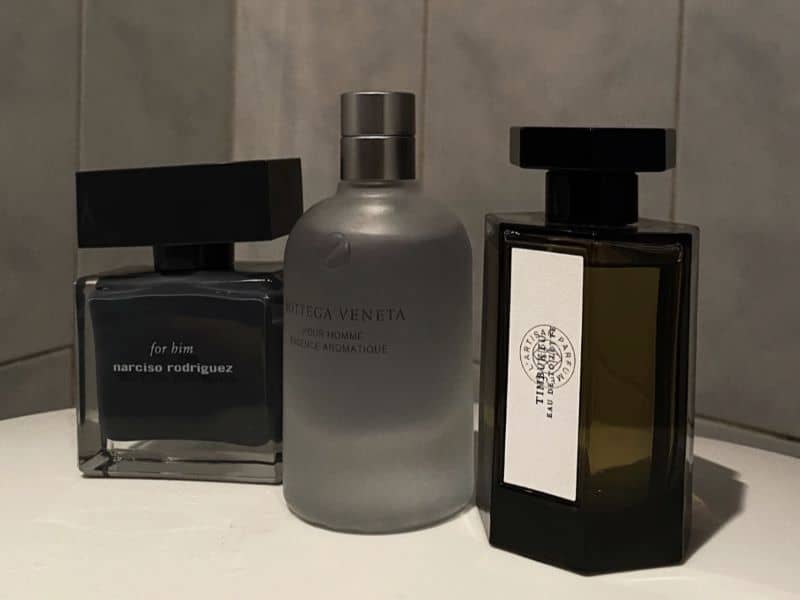These two terms are often used interchangeably, but if you own bottles of each one, you might notice that they’re not the same. If you’ve wondered about the difference between perfume and cologne, no worries, I’ll explain it all for you in this post.
The primary difference between perfume and cologne is the amount of fragrance oil that’s added to each formula. Due to this variation, the way that you experience scents from perfume vs cologne will also differ. Perfume is more intense, giving it more longevity. Cologne is more subtle, limiting its projection and longevity.
Keep reading to learn about more specific differences between the two. This information will help you understand why you might want to purchase one over the other.

How are Perfume and Cologne Different?
When I was growing up, fragrance advertisements made one distinction between perfume and cologne. That distinction was gender. Perfumes were advertised for women and colognes were marketed to men.
In more recent times, it’s been made clear that there isn’t a gender distinction between perfume and cologne, but that has led to people using either word to describe both types of fragrances.
But in the fragrance industry, there is a more exacting approach to distinguishing between perfume and cologne. The amount of fragrance oils used to make each one is that primary differing factor.
Perfume vs Cologne: Fragrance Oil Concentration
As you may have known this, fragrances are made with three primary ingredients: ethyl alcohol, water, and fragrance compounds. The ratio of fragrance oil to alcohol and water is assigned a percentage range by category.
Common categories range from highest to lowest fragrance strength:
- Extrait de parfum
- Parfum
- Eau de parfum
- Eau de toilette
- Eau de cologne
- Eau fraiche
The term perfume can blindly apply to any fragrance but it’s most often used in reference to eau de parfum, so that’s how I’m going to refer to it in this post.
French terms are used because France spearheads the modern-day fragrance industry. More specifically, Grasse is a small town in France that is mighty in terms of its influence on the crop growth, quality, and advancement of fragrance ingredients.
Many notable perfume houses exist in Grasse. The highly reputed Grasse Institute of Perfumery (GIP) was founded there in 2002. It can take ten years or more to become a perfumer.
There’s more to fragrance formulation than settling on a top, middle, and base note. Perfumers engaged in specialized study incorporating not only the history and science behind scents but how to apply them to products.
They study raw materials and learn how to best use them to create and recognize fragrance accords. But there’s also artistry woven into the process. Candidates usually have a background in science, but as perfumers, they learn how to evoke a certain feeling using scent.
And this feeling is partially influenced by the amount of fragrance oil added to a scent formulation.
That said, an eau de parfum can have between 15-20% fragrance concentration. Eau de cologne usually has 3-5% of fragrance oils in it.
As you can see, that’s a significant difference, which is why preference and function play a huge role in determining whether you should purchase perfume or cologne.
Perfume vs Cologne: Longevity
Due to its higher scent concentration, you can expect a perfume to last on your skin longer than a cologne. Perfumes can last for 8 hours or more. Colognes typically last for 4 hours or less.
But there can be benefits or disadvantages to both.
When wearing a cologne, the obvious disadvantage that some people experience is that they wish the scent would last longer. But on the upside, you can easily shower mid-day, and then apply a different fragrance, if desired. In most cases, you won’t have to worry about clashing scents because the cologne would already have evaporated from your skin.
And due to its lower oil content, it will not have sunken too deeply into your skin pores. This makes it less difficult to remove from your skin during a shower.
The primary advantage of wearing perfume is that you can smell it on you for most of the day. This makes it easier for it to become a signature scent. But the downfall is that it’s harder to remove from your skin due to its oil content.
You wouldn’t be able to switch scents mid-day without more effort.
Perfume vs Cologne: Projection
I’m sure you can guess that cologne tends not to project as far because it’s a lighter scent. This is why it’s best not to wear cologne during colder months. It’s unlikely that you’ll smell it.
Perfume on the other hand can vary, but for the most part, it will extend beyond your person on a grander scale than cologne would.
Perfume vs Cologne: Sillage
Sillage isn’t determined by projection or longevity. The scent trail that you leave behind can exist with cologne or perfume.
And this trail can be weak, strong, or somewhere in the middle regardless of what kind of fragrance you’re wearing.
Perfume vs Cologne: Price Differences
Understanding all of this can offer some insight into the price differences between perfume and cologne.
Cologne is notoriously less expensive than perfume and that is because there’s less of its most expensive ingredient – the fragrance oil.
Perfumes can vary in price based on brand, ingredients used, and bottle size, but they’re typically more expensive than cologne because significantly more fragrance oil is used to make perfume.
Why Does Cologne Smell Stronger than Perfume?
There are times when it seems as though a man’s cologne is quite strong. This may seem counterintuitive since I’ve just explained how there’s less fragrance oil in cologne in comparison to perfume.
Excessive Application
Well, the reason why cologne can smell so strong is essentially because it’s so subtle. When some people apply fragrances to their body, they expect for it to be noticeable. And if a person doesn’t understand that cologne will be less noticeable than perfume, they respond by overapplying their cologne.
So, colognes can smell stronger, not because their formula is stronger, but because a person applies too much in response to the scent being too light.
Nose Blindness is Real
And in some cases, a person who’s been wearing the same scent for months or years can become nose blind to it. Once nose blind, you can’t smell how strong your fragrance is, so you tend to apply more of it to your body.
This is why it helps to understand the differences between cologne and perfume. When you have a balanced view of them, then you won’t expect for one to perform in the same way as the other one does. And you won’t overapply either of them due to nose blindness.
Experiment with Your Spray Amount
When wearing cologne (or perfume), do yourself and others a favor by only spraying a few squirts, no more than three. And three might even be excessive.
You might want to test how the cologne performs on your body before deciding on the number of sprays that work well for you.
Begin with one spray, wear it for half a day and take notice of whether or not you and others can smell your cologne. If not, then try two sprays the next time you wear it. Test the waters again before adding on another pump of the fragrance.
But if you still aren’t satisfied with the scent intensity after three sprays, I think you’d be better off transitioning to a perfume instead of dousing yourself with cologne.
Should You Buy Perfume or Cologne?
Deciding whether or not to purchase perfume or cologne depends on your needs, preferences, and how you plan to use the fragrance.
If you want a lasting scent that’s immediately noticeable, then you’ll want to buy perfume. For a lighter scent mostly worn in spring or summer that lasts about half the day, a cologne would be the best choice.
During the fall or winter, most perfumes will still project well, but that’s unlikely to happen with cologne. For those who dislike or are unable to tolerate strong fragrances, then cologne can give you a faint scent to enjoy for a portion of the day.
Hopefully this article has helped you understand the difference between perfume and cologne. I’m sure you’ll make a good choice between the two.
Read more:
